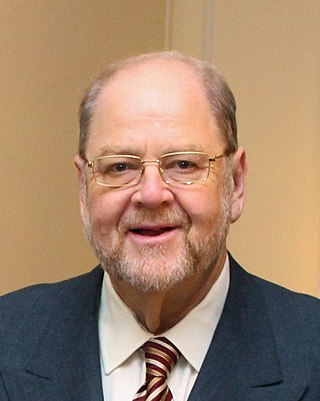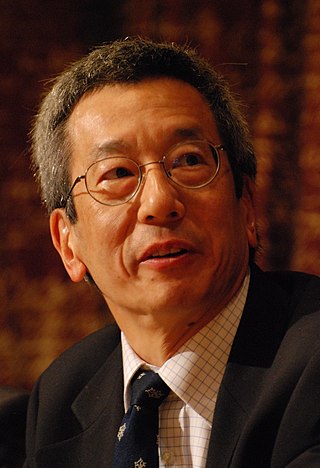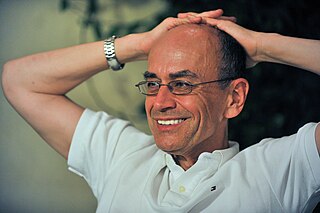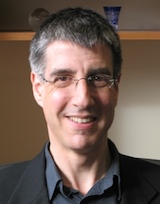Related Research Articles

Erwin Neher is a German biophysicist,specializing in the field of cell physiology. For significant contribution in the field,in 1991 he was awarded,along with Bert Sakmann,the Nobel Prize in Physiology or Medicine for "their discoveries concerning the function of single ion channels in cells".
Terrence Joseph Sejnowski is the Francis Crick Professor at the Salk Institute for Biological Studies where he directs the Computational Neurobiology Laboratory and is the director of the Crick-Jacobs center for theoretical and computational biology. He has performed pioneering research in neural networks and computational neuroscience.

Rodolfo Llinás Riascos is a Colombian and American neuroscientist. He is currently the Thomas and Suzanne Murphy Professor of Neuroscience and Chairman Emeritus of the Department of Physiology &Neuroscience at the NYU School of Medicine. Llinás has published over 800 scientific articles.

James Edward Rothman is an American biochemist. He is the Fergus F. Wallace Professor of Biomedical Sciences at Yale University,the Chairman of the Department of Cell Biology at Yale School of Medicine,and the Director of the Nanobiology Institute at the Yale West Campus. Rothman also concurrently serves as adjunct professor of physiology and cellular biophysics at Columbia University and a research professor at the UCL Queen Square Institute of Neurology,University College London.
Bertil Hille is an Emeritus Professor,and the Wayne E. Crill Endowed Professor in the Department of Physiology and Biophysics at the University of Washington. He is particularly well known for his pioneering research on cell signalling by ion channels. His book Ion Channels of Excitable Membranes has been the standard work on the subject,appearing in multiple editions since its first publication in 1984.

Roger Yonchien Tsien was an American biochemist. He was a professor of chemistry and biochemistry at the University of California,San Diego and was awarded the Nobel Prize in Chemistry in 2008 for his discovery and development of the green fluorescent protein,in collaboration with organic chemist Osamu Shimomura and neurobiologist Martin Chalfie. Tsien was also a pioneer of calcium imaging.
The Vilcek Institute of Graduate Biomedical Sciences at the NYU School of Medicine is a division of the New York University Graduate School of Arts and Science,leading to the Ph.D. degree and,in coordination with the Medical Scientist Training Program,combined M.D./Ph.D. degrees. The institute sets the policies for its admissions,curriculum,stipend levels,student evaluations and Ph.D. requirements.
Richard Vance Wolfenden NAS AAA&S is an Alumni Distinguished Professor of chemistry,biochemistry and biophysics at the University of North Carolina at Chapel Hill. He was elected to the National Academy of Sciences in 2002. His research involves the kinetics of enzymatic reactions,and his laboratory has made significant contributions to the understanding of catalytic rate enhancements.

Thomas Christian Südhof,ForMemRS,is a German-American biochemist known for his study of synaptic transmission. Currently,he is a professor in the school of medicine in the department of molecular and cellular physiology,and by courtesy in neurology,and in psychiatry and behavioral sciences at Stanford University.

Feng Depei or Te-Pei Feng was a Chinese neuroscientist and physiologist. He is considered one of founders of modern Chinese neuroscience and physiology.
The Department of Physiology,Development and Neuroscience,(PDN) is a part of the School of Biological Sciences at the University of Cambridge. Research in PDN focuses on three main areas:Cellular and Systems Physiology,Developmental and Reproductive Biology,and Neuroscience and is currently headed by Sarah Bray and William Colledge. The department was formed on 1 January 2006,within the School of Biological Sciences at the University of Cambridge from the merger of the Departments of Anatomy and Physiology. The department hosts the Centre for Trophoblast Research and has links with the Cambridge Centre for Brain Repair,the Cambridge Stem Cell Institute,and the Gurdon Institute.

Richard H. Scheller is the former Chief Science Officer and Head of Therapeutics at 23andMe and the former Executive Vice President of Research and Early Development at Genentech. He was a professor at Stanford University from 1982 to 2001 before joining Genentech. He has been awarded the Alan T. Waterman Award in 1989,the W. Alden Spencer Award in 1993 and the NAS Award in Molecular Biology in 1997,won the 2010 Kavli Prize in Neuroscience with Thomas C. Südhof and James E. Rothman,and won the 2013 Albert Lasker Award for Basic Medical Research with Thomas Südhof. He was also given the Life Sciences Distinguished Alumni Award from University of Wisconsin–Madison. He is a Fellow of the American Academy of Arts and Sciences and a Member of the National Academy of Sciences.

Daniel Mark Wolpert FRS FMedSci is a British medical doctor,neuroscientist and engineer,who has made important contributions in computational biology. He was Professor of Engineering at the University of Cambridge from 2005,and also became the Royal Society Noreen Murray Research Professorship in Neurobiology from 2013. He is now Professor of Neurobiology at Columbia University.

Michael Neil Shadlen is an American neuroscientist and neurologist,whose research concerns the neural mechanisms of decision-making. He has been Professor of Neuroscience at Columbia University since 2012 and a Howard Hughes Medical Investigator since 2000. He is a member of the Kavli Institute for Brain Science,a Principal Investigator at the Mortimer B. Zuckerman Mind Brain Behavior Institute and an elected member of the National Academy of Medicine and National Academy of Sciences.
Rishikesh Narayanan is an Indian neuroscientist,computer engineer and a professor at the Molecular Biophysics Unit (MBU) of the Indian Institute of Science. He is the principal investigator at the Cellular Neurophysiology Laboratory of MBU where his team is engaged in researches on experimental and theoretical aspects of information processing in single neurons and their networks. The Council of Scientific and Industrial Research,the apex agency of the Government of India for scientific research,awarded him the Shanti Swarup Bhatnagar Prize for Science and Technology,one of the highest Indian science awards,in 2016,for his contributions to biological sciences.

Dora Angelaki is a Professor of Neuroscience in the New York University Tandon School of Engineering. She previously held the Wilhelmina Robertson Professorship of Neuroscience at the Baylor College of Medicine. She looks at multi-sensory information flow between subcortical and cortical areas of the brain. Her research interests include spatial navigation and decision-making circuits. She was elected to the National Academy of Sciences in 2014.
HollisT. Cline is an American neuroscientist and the Director of the Dorris Neuroscience Center at the Scripps Research Institute in California. Her research focuses on the impact of sensory experience on brain development and plasticity.
Moses V. Chao is a neuroscientist and university professor at NYU Langone Health Medical Center. He studies the mechanisms of neuronal growth factor and teaches courses in cell biology,neuroscience,and physiology. He is a Fellow of the American Association for the Advancement of Science and was President of the Society for Neuroscience in 2012.

Sabine Kastner is a German-born American cognitive neuroscientist. She is professor of psychology at the Princeton Neuroscience Institute at Princeton University. She also holds a visiting scientist appointment at the University of California at Berkeley.
References
- ↑ "Richard Tsien". www.nasonline.org.
- 1 2 Tsien, Richard Winyu (1970). The kinetics of conductance changes in heart cells. jisc.ac.uk (DPhil thesis). University of Oxford. OCLC 1062088005. EThOS uk.bl.ethos.475592.
- ↑ "Richard W. Tsien, Internationally Renowned Scientist, to Be Inaugural Director of New Neuroscience Institute - Newswise: News for Journalists". www.newswise.com.
- ↑ "Richard Tsien". Stanford University School of Medicine. Retrieved 22 October 2013.
- ↑ "Bio". tsienlab.med.nyu.edu. Retrieved 17 June 2019.
- ↑ "Bio". www.stanford.edu. Retrieved 17 June 2019.
- ↑ "Neurotree - Richard W. Tsien". neurotree.org.
- ↑ The CV of Richard W. Tsien, Ph.D. [ dead link ]
- ↑ "Tsien, Richard W." BIOGRAPHICAL SKETCH. Stanford University School of Medicine. Archived from the original on 12 June 2013. Retrieved 22 October 2013.
- ↑ "PNAS Member Editor Details". nrc88.nas.edu.
- ↑ "Walter B. Cannon Award Lecture". Awards—Other APS Awards—Recipients. American Physiological Society. 1996. Retrieved 23 March 2015.
- ↑ Academia Sinica - Life Sciences: Academician Richard Win-Yu Tsien
- ↑ Nobelprize.org 2008 Nobel Prize Laureate in Chemistry - Roger Y. Tsien